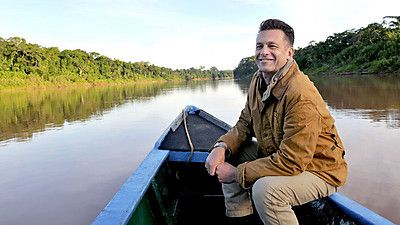Secrets of Our Living Planet
Secrets of Our Living Planet
Waterworlds (1x4)
: 08, 2012
In the final part of the series, Chris makes an epic journey, from the mountain streams of Iceland to the deep of the Indian Ocean, via the wetlands of the Pantanal in Brazil and the coastal swamps of Bangladesh. And on the way, he reveals how our most important ecosystems, overcome the daily challenge of living in medium that is constantly on the move.
He shows us how the Pantanal wetland in Brazil, while being a land of the giants (the world’s biggest snake, water lily, rodent, otter – you name it, they all live here), actually couldn’t work without the humble apple snail. Thanks to this animal, the Pantanal is able to recycle nutrients and regenerate itself in all its amazing glory, every year.
Chris then travels to the Sunderbans – a vast mangrove swamp at the mouth of the Ganges. After the Pantanal, it seems amazing that anything at all can live in what appears to be a sticky, sulphurous ooze. But, in fact, there is so much life here that this place supports a quarter of the world’s tiger population. Once again, it’s all down to a group of unsung heroes – the crabs on the beach. These animals dig burrows that not only supply oxygen and food to the roots of the mangroves; they also mix the toxic seawater with freshwater so that these trees can thrive.
Chris then heads out to sea, to the coral reefs of the Maldives. Here he investigates the puzzle of where reefs get their food. After all, their waters are crystal clear, so where are the nutrients? The answer comes in the very unlikely form of one of the weirdest animals on the planet. Sponges have no eyes or nervous system and can’t move. But what’s really weird is the way they eat their food. They pump seawater through their bodies at such a high rate that they are able to harvest enough nutrients, from the microscopic particles in the water. And, thanks to the sponges capturing these nutrients, the whole reef can thrive.
Chris then sails out into the deep ocean to reveal how ocean
